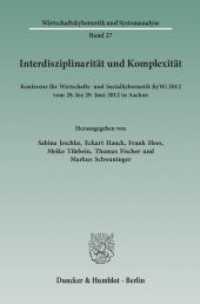- ホーム
- > 洋書
- > 英文書
- > History / World
Full Description
What role did the parish play in people's lives in England and Wales between 1700 and the mid-twentieth century? By comparison with globalisation and its dislocating effects, the book stresses how important parochial belonging once was. Professor Snell discusses themes such as settlement law and practice, marriage patterns, cultures of local xenophobia, the continuance of out-door relief in people's own parishes under the new poor law, the many new parishes of the period and their effects upon people's local attachments. The book highlights the continuing vitality of the parish as a unit in people's lives, and the administration associated with it. It employs a variety of historical methods, and makes important contributions to the history of welfare, community identity and belonging. It is highly relevant to the modern themes of globalisation, de-localisation, and the decline of community, helping to set such changes and their consequences into local historical perspective.
Contents
Preface and acknowledgements; 1. Introduction - belonging and local attachment; 2. The culture of local xenophobia; 3. Settlement, parochial belonging and entitlement; 4. Rural societies and their marriage patterns; 5. 'A cruel kindness': parish out-door relief, and the new poor law; 6. Nailed to the church door? Parish overseers and the new poor law; 7. Three centuries of new parishes; 8. `Of this parish': gravestones, belonging and local attachment; 9. Conclusion - belonging, parish and community; Select bibliography.







